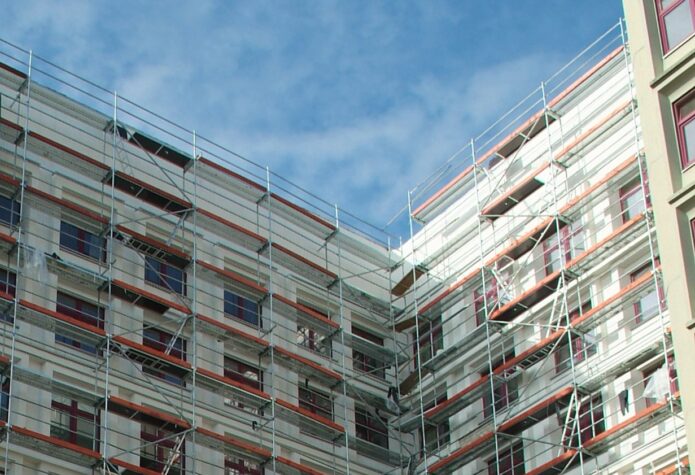Lithuania: Improving energy efficiency in buildings despite slowdown

Many thousands of Soviet-era buildings in Lithuania need renovation for better energy efficiency. The renovation programme carried out by the government will allow energy losses and carbon emissions to be reduced as well as help create new jobs during the economic downturn, says Aloyzas Vitkauskas, Vice-Minister at the Ministry of Finance of Lithuania, in an interview with the NIB Newsletter.
The needs for renovation and improved energy efficiency of public buildings in the country total at least EUR 1 billion, according to the Ministry’s estimates.
This is a considerable cost for a Baltic country, but it’s even more costly to use 30-50% of a building’s energy consumption on “warming up the street” due to the low construction quality.

“Energy efficiency and the reduction of greenhouse gas emissions were not among the priorities for builders during the Soviet era.”
Aloyzas Vitkauskas
Vice-Minister at the Ministry of Finance of Lithuania
To fund the Lithuanian government’s building renovation programme, in late 2009, NIB and the Republic of Lithuania signed a new loan agreement that secures EUR 100 million.
Building on solid experience
An earlier attempt—on a smaller scale and also NIB-financed—to remedy energy losses was undertaken between 1996 and 2005.
“It was a very soft kickoff, a pilot. Due to lack of funds, the project envisaged only partial renovation-a heating system in one hospital, walls in another,” says Mr Vitkauskas.
The new programme is wider in scope. The Ministry of Finance has a project pipeline for upgrading public buildings, including the universities in the country’s three largest cities—Vilnius, Kaunas and Klaipeda—as well as hospitals, theatres, museums, schools, district courts, clinics, police stations and the offices of the national road administration.
The project envisages the reconstruction and renovation of 39 buildings with a total area of 230,000 square metres.
Despite the economic slowdown, which has been felt especially acutely in the Baltic countries, Lithuania is aiming at completing the renovation of the public buildings within the coming years.
“Therefore we are borrowing from international financial institutions, although it does affect the state finances and increases the budget deficit,” says the Vice-Minister.
Fuelling economy in recession
The benefits of the new investment programme include more than cutting out energy losses and reducing emissions.
“This is also stimulus for the construction sector,” says Mr Vitkauskas. The project will also generate new jobs in the construction sector and tax revenue for the state budget.
“It will also help optimise the heating costs and, of course, improve the hygienic conditions in the renovated buildings,” adds Mr Vitkauskas.
In addition to the loan, Lithuania is using EU structural funds and is considering employing public-private partnerships (PPP) to attract private investors.
The public sector would assume the responsibility of managing the contingent liability for 20 years. The regulatory framework and procedures for PPP have already been approved by the government.
“At the moment, we are establishing a knowledge and competence centre as a task force for this process,” says Mr Vitkauskas.
A pilot PPP project in the building energy efficiency and renovation is being scheduled for 2010.
“Our intention is to cover about half of the entire need for the renovation of the public buildings in the country with the help of the PPP scheme,” he says.
“While getting ready for PPP, we also realise the importance of project finance,” he adds.
As banks tighten their credit policies in the current circumstances, getting access to financing for private sector investments is a challenge.
Mr Vitkauskas sees a great potential for the international financial institutions in this area. He thinks that institutions like NIB could establish credit lines for local intermediary banks specifically for the purposes of project finance in the building renovation programme.
Taking advantage of the downturn
Apart from the public buildings, energy efficiency needs to be improved in private apartment buildings all over the country.
There are about 300 projects for renovation of residential buildings in the pipeline.
Here, the situation is somewhat more complicated, as the buildings belong to home owner associations.
According to the rules, the state provides a grant for no more than half of the investment necessary for renovating a private residential building.
The other half needs to be financed by the home owners themselves.
“It’s not easy for the home owner associations to come to a common decision on whether to borrow money for investing in the renovation of their common property.
The state is helping them by carrying out educational campaigns,” says Mr Vitkauskas.
“We are also urging the private owners to take advantage of the current construction costs, which have decreased dramatically during the economic downturn,” he concludes.
Once renovated, a building applies for an energy efficiency certificate issued by the Lithuanian energy auditors.
